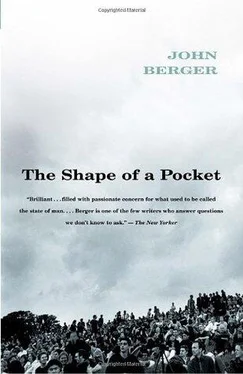we’re going to take up again
the struggle/again we’re going to begin
again we’re going to begin all of us
against the great defeat of the world/
little compañeros who never end/or
who burn like fire in the memory
again/and again/and again.
* One of the most original, even if contested, is the Millennium of Hieronymus Bosch by Wilhelm Franger (Faber & Faber).
* This letter was published in August 1997 throughout the world press, and notably in Le Monde Diplomatique , Paris.
* Juan Gelman, Unthinkable Tenderness , translated from the Spanish by Joan Lindgren (University of California Press, 1997).
23 Correspondence with Subcomandante Marcos
Spring is the awaited season. Some languages, like Spanish, make spring feminine; others, like Greek, masculine. Once arrived, the two of them stay for a weekend, hand over to a successor, and slip away.
Yet from January onwards we gossip about them as though they were there in hiding. And under the earth’s skin they are there: the branches of elders already suffer burgeoning wounds, snowdrops already push with their heads, teeth clenched. When at last spring comes out into the open we have the impression of ‘no sooner come than gone’.
Not a season at all but a longing. At my age it is natural to ask: how many more times shall I witness this waiting? The waiting is for a new beginning. It is not a question of the year being young but of the offer of choices again. In the winter of discontent, there are no choices.
The first season comes desperately and hopefully which is another reason for its necessary clandestinity. And here I think of your letter, Marcos, where you write:
We would like to offer you a flower, I say a flower because we don’t have enough for all of you, but one is enough if you share it and if each one of you keeps a tiny fragment so that when you are old you can tell the children of your country: At the end of the twentieth century I fought for Mexico and from here I gave support to those over there: of whom I knew only that they wanted what all human beings want if they haven’t forgotten that they’re human beings, that’s to say democracy, liberty and justice. I never saw their faces but their hearts were like ours.
This year spring came out into the open on April 12th and I’ll tell you how. Your mountains are higher than ours but when you take one of the tracks down to the plain, you must come upon a somewhat similar place. At a certain altitude a rocky stream runs into a small lake and the vegetation turns a little greener. The lake seeps into the earth which is waterlogged and is difficult to cross. It’s easier to skirt round the place.
In a month’s time, thousands of frogs will come to mate in the pool. At the moment it still freezes at night and in the morning some of the boulders glisten with frost. Over the years I’ve often seen a heron here. Sometimes he is perched near the top of one of the spruce firs. Sometimes he is standing in the marsh, his fishing beak at the ready. When a heron strikes, he does so with a rapidity which is faster than an eye blinking, and after a heron has prepared a nest and is calling for a female companion, he holds his head so that his beak points vertically into the sky like a steeple or like a Brancusi sculpture. Every winter the herons migrate from our rivers to North Africa.
Yet every year it is the same heron who returns here. Herons can live for twenty years or more. I guess this one is no longer young and maybe that is why he is a loner who avoids the settlements where the others nest. I’ve never seen him with his companion but I’ve seen him flying regularly to a hidden nest to regurgitate the frog or fish he has just eaten as food for his fledglings.
Apart from the heron, there’s nothing special about the place: a pool of water, a small bog, a steepish slope. It’s on the north side of the mountain and so gets little sunlight. One of nature’s backyards, not recommended for its flowers. And here, on Wednesday April 12th this year, spring came out into the open.
I didn’t notice anything special at first. Then gradually I became aware, before I looked up, that something unusual was happening in the sky. Nothing alarming. Rather something measured and solemn. So I glanced up.
There were two herons circling with slow wing-beats. They were low enough for me to see the black feathers like ribbons which trail from their ears. Grey wings, white throats. Whilst they flew around me one of them crossed the circle to be nearer to the other, and the other flew to meet the first, and like this both found themselves again on opposite sides of the same circle.
It was their first morning. They had come back. Ornithologists say that the male heron searches for a partner only after he has established a nest. In which case this pair was an exception. They were cautiously surveying the terrain together.
Yet what caught my breath, Marcos, was the leisure, the ease with which they were doing this. In that leisure there was a momentary yet supreme confidence and sense of belonging. Slowly they circled the place as if they were surveying their own lives to which they had come home.
And this made me think of you in Chiapas and of your struggle to restore what has been stolen from the people by those who in this life know two things: how to transfer money and how to drop bombs. In their world there are no homecomings and there never will be. Four things came together in my head: the spring, the resistance of the Zapatistas, your vision of a different world and the slow beat of the herons’ wings.
II. The Herons and Eagles
A reader may ask: What is the writer’s relationship with the place and the people he writes about?
John Berger, Pig Earth
Agreed, but he could also ask himself: What is the relationship between a letter written in the jungle of Chiapas, Mexico and the response that it receives from the French countryside? Or, even better, what is the relationship between the slow beating of the wings of the heron with the hovering of the eagle over a serpent?
For example, in Guadalupe Tepeyac (now a village empty of civilians and filled with soldiers), the herons took over the night sky of December.
There were hundreds. ‘Thousands,’ says Lieutenant Ricardo, a Tzeltal insurgent who sometimes has a propensity to exaggerate. ‘Millions,’ said Gladys who, despite being twelve years old (or precisely because of it), does not want to be left out. ‘They come every year,’ says the grandfather while the small flashes of white hover above the village, and maybe disappear towards the east?
Are they coming or going? Are they your herons, Mr Berger? A winged reminder? Or a greeting filled with premonition? A fluttering of wings of something that resists death?
Because as a result, months later, I read your letter (in a dog-eared clipping from a newspaper, with the date hidden under a mud stain), and in it (your letter) the wings of dawn are hovering once again in the sky and the people of Guadalupe Tepeyac now live in the mountain and not in the little valley whose lights, I imagine, are of some significance on the navigation maps of the herons.
Yes, I know now that the herons, about which you wrote to me, fly during the winter from North Africa, and that it is improbable that they have anything to do with those that arrived in December 1994 in the Lacandon jungle. In addition the grandfather says that every year the disconcerting tour above Guadalupe Tepeyac is repeated.
Perhaps south-eastern Mexico is an obligatory stopover, a necessity, a commitment. Perhaps they were not herons, but fragments of an exploded moon, pulverised in the December of the jungle.
Читать дальше












